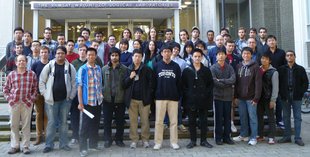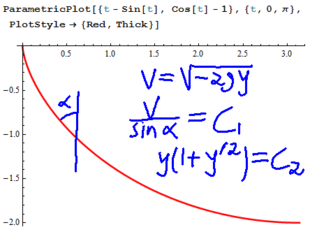12-267/The Final Exam: Difference between revisions
Dongwoo.kang (talk | contribs) No edit summary |
No edit summary |
||
| Line 1: | Line 1: | ||
{{12-267/Navigation}} |
{{12-267/Navigation}} |
||
==The Results== |
|||
45 students took the exam; the average grade was 67, the standard deviation was 25, and the exam itself is at {{pensieve link|Classes/12-267/Final.pdf|Final.pdf}}. |
|||
Restricted to the 45 students who took the final, the average course grade was 75 and the standard deviation was 18. |
|||
==Announcement== |
|||
Our final exam is coming up. It will take place on Tuesday December 18th, from 7PM until 10PM (believe me that wasn't my decision), at East Hall, University College, 15 King's College Circle. |
Our final exam is coming up. It will take place on Tuesday December 18th, from 7PM until 10PM (believe me that wasn't my decision), at East Hall, University College, 15 King's College Circle. |
||
| Line 28: | Line 35: | ||
'''Remember.''' Neatness counts! Organization counts! Language counts! Proofs are best given as short and readable essays; without the English between the formulas one never knows how to interpret those formulas. When you write, say, "<math>x\in[0,1]</math>", does it mean "choose <math>x\in[0,1]</math>", or "we've just proven that <math>x\in[0,1]</math>", or "assume by contradiction that <math>x\in[0,1]</math>", or "for every <math>x\in[0,1]</math>" or "there exists <math>x\in[0,1]</math>"? If you don't say, your reader has no way of knowing. Also remember that long and roundabout solutions of simple problems, full of detours and irrelevant facts, are often an indication that their author didn't quite get the point, even if they are entirely correct. Avoid those! |
'''Remember.''' Neatness counts! Organization counts! Language counts! Proofs are best given as short and readable essays; without the English between the formulas one never knows how to interpret those formulas. When you write, say, "<math>x\in[0,1]</math>", does it mean "choose <math>x\in[0,1]</math>", or "we've just proven that <math>x\in[0,1]</math>", or "assume by contradiction that <math>x\in[0,1]</math>", or "for every <math>x\in[0,1]</math>" or "there exists <math>x\in[0,1]</math>"? If you don't say, your reader has no way of knowing. Also remember that long and roundabout solutions of simple problems, full of detours and irrelevant facts, are often an indication that their author didn't quite get the point, even if they are entirely correct. Avoid those! |
||
==Office Hours== |
===Office Hours=== |
||
Jordan and I will hold pre-exam office hours as follows: |
Jordan and I will hold pre-exam office hours as follows: |
||
* Friday December 14, 3PM-5:30PM, with Jordan at the Math Lounge (the round room on the 6th floor of Bahen). |
* Friday December 14, 3PM-5:30PM, with Jordan at the Math Lounge (the round room on the 6th floor of Bahen). |
||
Latest revision as of 21:28, 21 December 2012
| ||||||||||||||||||||||||||||||||||||||||||||||||||||||||||||
The Results
45 students took the exam; the average grade was 67, the standard deviation was 25, and the exam itself is at Final.pdf.
Restricted to the 45 students who took the final, the average course grade was 75 and the standard deviation was 18.
Announcement
Our final exam is coming up. It will take place on Tuesday December 18th, from 7PM until 10PM (believe me that wasn't my decision), at East Hall, University College, 15 King's College Circle.
Sample Final
See SampleFinal.pdf.
Content and Style
It will consist of 5-6 questions (each may have several parts) on everything that we have covered in class this semester:
- Basic techniques: linear, separated, exact equations, integrating factors, etc.
- The Fundamental Theorem (existence and uniqueness).
- Calculus of Variations.
- Numerical methods.
- High order linear equations with constant coefficients, "undetermined coefficients".
- Systems of linear equations with constant coefficients, matrix exponentiation, phase portraits, Wronskians, non-homogeneous systems.
- Series solutions and regular singular points.
- Qualitative analysis.
As for the style -
- You can expect to be asked to reproduce some proofs that were given in class.
- You can expect some fresh things to prove, though generally not as hard as the previous type of proofs.
- You can expect questions (or parts of questions) that will be identical or nearly identical to questions that were assigned for homework.
- You can expect some calculations (but nothing that will require a calculator).
Basic calculators (not capable of displaying text or sounding speech) will be allowed but will not be necessary. You may wish to bring one nevertheless, as under pressure [math]\displaystyle{ 5+7 }[/math] often comes out to be [math]\displaystyle{ 13 }[/math].
Remember. Neatness counts! Organization counts! Language counts! Proofs are best given as short and readable essays; without the English between the formulas one never knows how to interpret those formulas. When you write, say, "[math]\displaystyle{ x\in[0,1] }[/math]", does it mean "choose [math]\displaystyle{ x\in[0,1] }[/math]", or "we've just proven that [math]\displaystyle{ x\in[0,1] }[/math]", or "assume by contradiction that [math]\displaystyle{ x\in[0,1] }[/math]", or "for every [math]\displaystyle{ x\in[0,1] }[/math]" or "there exists [math]\displaystyle{ x\in[0,1] }[/math]"? If you don't say, your reader has no way of knowing. Also remember that long and roundabout solutions of simple problems, full of detours and irrelevant facts, are often an indication that their author didn't quite get the point, even if they are entirely correct. Avoid those!
Office Hours
Jordan and I will hold pre-exam office hours as follows:
- Friday December 14, 3PM-5:30PM, with Jordan at the Math Lounge (the round room on the 6th floor of Bahen).
- Monday December 17, 10:30AM-11:30AM, with Dror at Bahen 6178.
- Monday December 17, 3PM-5:30PM, with Jordan at the Math Lounge.
- Tuesday December 18, 10AM-Noon and 3PM-5PM, with Dror at Bahen 6178.

